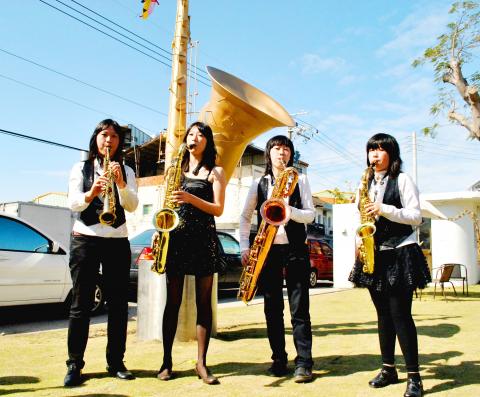A saxophone museum documenting the life of Taiwan’s first saxophone maker and the development of saxophone making in Houli District (后里), Greater Taichung, opened to the public yesterday.
The Chang Lien-cheng (張連昌) Saxophone Museum is named after a local resident who made the first saxophone in Taiwan on his own, sparking the development of the saxophone production industry in Houli, which is now one of the largest centers of saxophone production in the world.
TOURIST-FRIENDLY

Photo: CNA
Located in a town nicknamed “Musical Instrument Town,” the museum will display a collection of saxophones. Previously a memorial hall dedicated to Chang, the museum site now has a new two-story building, a concert hall and a tourist-friendly factory that allows visitors to see how the instrument is made.
“The museum is certainly not the only saxophone museum in Taiwan, but it is definitely the only one with a lot of stories to be shared,” Wang Tsai-jui (王彩蕊), Chang’s granddaughter-in-law, said in a telephone interview on Wednesday.
Chang, born in 1912, was a farmer’s son who abandoned the family’s farm to become a painter. He later joined a band when he was in his 20s.
“No one during the 1930s was actually playing any kind of Western instruments, but Chang was fascinated by the saxophone,” Wang said.
DETERMINED
When Chang’s saxophone was damaged in a fire, he was determined to build the brass tube by himself. He started from observing the shape of the instrument on canvas.
Three years into the making of the saxophone in 1948, he lost the sight in his right eye when a piece of copper flashed into his eyeball. However, the incident did not stop Chang from continuing his pursuit and the first locally made saxophone was finished shortly after the accident.
“The museum is really about showing the personality and perseverance of a person who loved music so much,” Wang said.
Chang trained a number of apprentices, helping saxophone making become a lucrative export industry for Taiwan from the 1950s to the 1990s. It’s no longer as profitable as it once was because of competition from China.
Two of the must-see saxophones in the museum are an intricately made instrument with a dragon decoration on the tube, specially made by Chang, and a 160-year-old saxophone produced by saxophone inventor Adolphe Sax, which was found and bought by Wang’s family through laborious trips to Belgium, Wang said.
FASCINATING
“We knew from the start that the museum is about more than showcasing the locally made instruments; we want to tell the very first story of this fascinating instrument,” Wang said.
Wang’s four daughters are all saxophone players.

Alain Robert, known as the "French Spider-Man," praised Alex Honnold as exceptionally well-prepared after the US climber completed a free solo ascent of Taipei 101 yesterday. Robert said Honnold's ascent of the 508m-tall skyscraper in just more than one-and-a-half hours without using safety ropes or equipment was a remarkable achievement. "This is my life," he said in an interview conducted in French, adding that he liked the feeling of being "on the edge of danger." The 63-year-old Frenchman climbed Taipei 101 using ropes in December 2004, taking about four hours to reach the top. On a one-to-10 scale of difficulty, Robert said Taipei 101

Nipah virus infection is to be officially listed as a category 5 notifiable infectious disease in Taiwan in March, while clinical treatment guidelines are being formulated, the Centers for Disease Control (CDC) said yesterday. With Nipah infections being reported in other countries and considering its relatively high fatality rate, the centers on Jan. 16 announced that it would be listed as a notifiable infectious disease to bolster the nation’s systematic early warning system and increase public awareness, the CDC said. Bangladesh reported four fatal cases last year in separate districts, with three linked to raw date palm sap consumption, CDC Epidemic Intelligence

Two Taiwanese prosecutors were questioned by Chinese security personnel at their hotel during a trip to China’s Henan Province this month, the Mainland Affairs Council (MAC) said yesterday. The officers had personal information on the prosecutors, including “when they were assigned to their posts, their work locations and job titles,” MAC Deputy Minister and spokesman Liang Wen-chieh (梁文傑) said. On top of asking about their agencies and positions, the officers also questioned the prosecutors about the Cross-Strait Joint Crime-Fighting and Judicial Mutual Assistance Agreement, a pact that serves as the framework for Taiwan-China cooperation on combating crime and providing judicial assistance, Liang

US climber Alex Honnold left Taiwan this morning a day after completing a free-solo ascent of Taipei 101, a feat that drew cheers from onlookers and gained widespread international attention. Honnold yesterday scaled the 101-story skyscraper without a rope or safety harness. The climb — the highest urban free-solo ascent ever attempted — took just more than 90 minutes and was streamed live on Netflix. It was covered by major international news outlets including CNN, the New York Times, the Guardian and the Wall Street Journal. As Honnold prepared to leave Taiwan today, he attracted a crowd when he and his wife, Sanni,